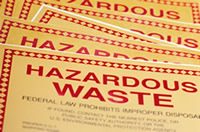Tag: EHS
EHS Managers Guide to the New 2012 Construction Stormwater General Permit
A-Z Pre-Inspection Checklist for EHS Regs
EHS Time-Saver–Pre-Inspection Checklist for Any Facility
1 Easy Thing You Can Do to Improve Your EHS Training
Hazardous Substance Storage: What are the Rules?
Here are some of the federal laws you should consider when storing hazardous substances: —Comprehensive Environmental Response, Compensation, and Liability Act (CERCLA), more commonly referred to as Superfund, was designed to help clean up inactive hazardous waste sites. It was modified to also require private industries to disclose to their communities and neighbors what hazardous […]
Generators: How to Tell If You Need an EPA ID Number for Your Hazardous Waste
Universal Wastes: How Long Can You Keep Them and How Are They Tracked?
Both small and large quantity handlers of universal waste must comply with an accumulation time limit of 1 year for storing universal wastes. A permit is not required. The accumulation period is measured from the time the waste is either generated (the date it becomes a waste) or received from another universal waste handler. Universal […]
Getting a Handle on Handling Universal Wastes
The goal of EPA‘s universal waste rule (40 CFR 273) is to reduce the amount of hazardous waste items in the municipal solid waste wastestream and encourage recycling and proper disposal of certain common or widely generated hazardous wastes. Wastes regulated under the universal waste rules include: Batteries Pesticides Thermostats Fluorescent and high-intensity discharge lamps […]
Important International Regulations for 2012
According to Ana, the European Chemicals Agency (ECHA) says industry should start preparing for the next big REACH (Registration, Evaluation, Authorization, and restriction of Chemicals) registration deadline. Companies manufacturing or importing chemicals in Europe—in quantities at or above 100 tons per year—are required to register such substances with ECHA by May 31, 2013. Enhance the […]






